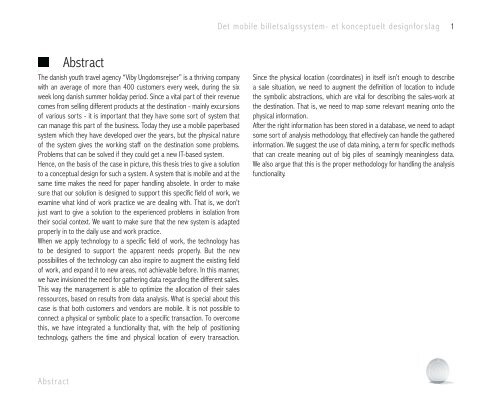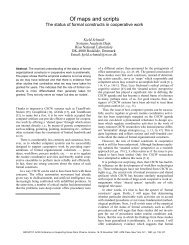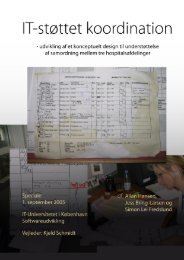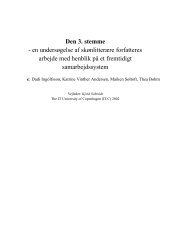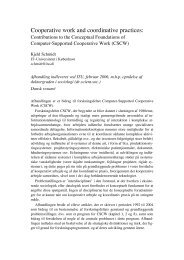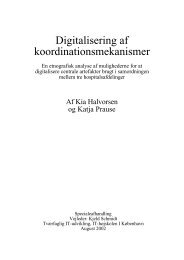Download thesis - Kjeld Schmidt
Download thesis - Kjeld Schmidt
Download thesis - Kjeld Schmidt
Create successful ePaper yourself
Turn your PDF publications into a flip-book with our unique Google optimized e-Paper software.
The danish youth travel agency “Viby Ungdomsrejser” is a thriving company<br />
with an average of more than 400 customers every week, during the six<br />
week long danish summer holiday period. Since a vital part of their revenue<br />
comes from selling different products at the destination - mainly excursions<br />
of various sorts - it is important that they have some sort of system that<br />
can manage this part of the business. Today they use a mobile paperbased<br />
system which they have developed over the years, but the physical nature<br />
of the system gives the working staff on the destination some problems.<br />
Problems that can be solved if they could get a new IT-based system.<br />
Hence, on the basis of the case in picture, this <strong>thesis</strong> tries to give a solution<br />
to a conceptual design for such a system. A system that is mobile and at the<br />
same time makes the need for paper handling absolete. In order to make<br />
sure that our solution is designed to support this specific field of work, we<br />
examine what kind of work practice we are dealing with. That is, we don’t<br />
just want to give a solution to the experienced problems in isolation from<br />
their social context. We want to make sure that the new system is adapted<br />
properly in to the daily use and work practice.<br />
When we apply technology to a specific field of work, the technology has<br />
to be designed to support the apparent needs properly. But the new<br />
possibilites of the technology can also inspire to augment the existing field<br />
of work, and expand it to new areas, not achievable before. In this manner,<br />
we have invisioned the need for gathering data regarding the different sales.<br />
This way the management is able to optimize the allocation of their sales<br />
ressources, based on results from data analysis. What is special about this<br />
case is that both customers and vendors are mobile. It is not possible to<br />
connect a physical or symbolic place to a specific transaction. To overcome<br />
this, we have integrated a functionality that, with the help of positioning<br />
technology, gathers the time and physical location of every transaction.<br />
Abstract<br />
Abstract<br />
Det mobile billetsalgssystem- et konceptuelt designfor slag 1<br />
Since the physical location (coordinates) in itself isn’t enough to describe<br />
a sale situation, we need to augment the definition of location to include<br />
the symbolic abstractions, which are vital for describing the sales-work at<br />
the destination. That is, we need to map some relevant meaning onto the<br />
physical information.<br />
After the right information has been stored in a database, we need to adapt<br />
some sort of analysis methodology, that effectively can handle the gathered<br />
information. We suggest the use of data mining, a term for specific methods<br />
that can create meaning out of big piles of seamingly meaningless data.<br />
We also argue that this is the proper methodology for handling the analysis<br />
functionality.


